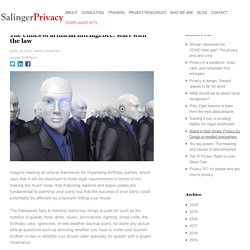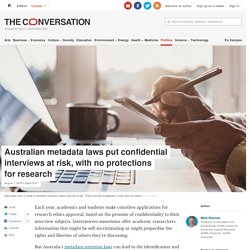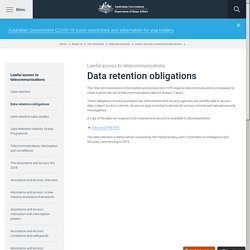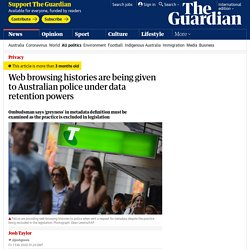

The COVIDSafe bill doesn't go far enough to protect our privacy. Here's what needs to change. The Australian government will need to correct earlier misstatements and improve privacy protections to gain the trust of the millions of Australians being called on to download the COVIDSafe contact tracing app.

The draft Privacy Amendment (Public Health Contact Information) Bill 2020, or the “COVIDSafe bill”, released yesterday, is the first step towards parliamentary legislation providing privacy protections for users of the app. The COVIDSafe bill includes some significant improvements on the protections offered by federal health minister Greg Hunt’s current determination under the Biosecurity Act, which put rules in place to encourage uptake of the app. However, the bill falls short on other substantial concerns. Improvements incorporated in the bill The COVIDSafe bill includes several amendments to the privacy protections originally set out in the determination, which the legislation is intended to replace.
Experts raise concerns about security of coronavirus tracing app COVIDSafe - ABC News. Covid-19 tracking app must satisfy human rights and data laws. The government’s plan to exit lockdown through a tracking app will need detailed justification to satisfy human rights and data protection laws, a report has warned.
A centralised system for contact tracing, which it is thought the government may well choose, would result in “significantly greater interference with users’ privacy and require greater justification”, the report – given as a legal opinion – concludes. Lawyers are now free to cherrypick defamatory Facebook comments, looking for nuggets of gold. The ramifications of Justice Stephen Rothman’s decision in the Dylan Voller case haven’t filtered downstream.

Media organisations now are on notice as to their hip-pocket liability for the mean, ignorant, beastly, defamatory muck that is frequently peddled by readers in response to story items posted on their associated Facebook pages. Yet the rest of the world hasn’t given a toss. The quality and quantity of the comments continues apace.
Only last Thursday when Mike Baird ruled himself out of contention for the top job at the National Australia Bank, the comments about the former NSW premier on the Sydney Morning Herald Facebook feed would be manna from heaven for a half-competent lawyer in the defamation business. Bob Brown also might have needed compensation as a result of Facebook comments on 3 July in connection to a “discussion” between Andrew Bolt and Rowan Dean on Sky News about “activist” crowdfunding to stop Adani. Google, Facebook users face lawsuits over defamatory reviews - ABC News. Updated 18 minutes agoTue 18 Feb 2020, 12:48am Online giants Google and Facebook are likely to face further court orders forcing them to identify people behind potentially defamatory statements made on their sites, lawyers warn.
Key points: Facebook and Google do not disclose the names of individuals posting offensive and potentially defamatory material unless there is a court orderLawyers predict more people will succeed in getting court orders that force the companies to identify the person posting Despite more expected litigation, the US companies are unlikely to change their policies to keep the identities of users private But experts argue the companies are unlikely to self-regulate and change policies to reveal user identities without court orders. Artificial Intelligence: Australia’s Ethics Framework - Law Council of Australia. The ethics of artificial intelligence: start with the law.
Imagine reading an ethical framework for organising birthday parties, which says that it will be important to meet legal requirements in terms of not making too much noise, that matching napkins and paper plates are fundamental to planning your party, but that the success of your party could potentially be affected by a tsunami hitting your house.

The framework fails to mention some key things to plan for such as the number of guests, food, drink, music, decorations, lighting, dress code, the birthday cake, speeches, or wet weather backup plans, let alone any actual ethical questions such as deciding whether you have to invite your boorish brother-in-law, or whether you should cater specially for guests with a gluten intolerance. You would be a bit worried about the utility of such a framework, right? Over-stating the importance of some factors, over-stating the risk of others, but also missing some really key things to consider in your planning. Big brother is watching: how new technologies are changing police surveillance.
When we think of surveillance, we tend to imagine traditional surveillance tools like CCTV systems run by local authorities.

The use of CCTV has certainly increased since I was a young constable on the Gold Coast in the early 1990s. From a CCTV network of 16 cameras when they were first introduced to the city precinct, the network has grown to more than 500 cameras today. But surveillance is much more than just CCTV. It now includes things like private home or business security systems, police body-worn cameras (BWC) and the use of helicopters and drones. And we all have the capacity to conduct surveillance and gather evidence using the technology contained in our mobile phones. These new technologies are changing the way police approach surveillance.
Quiz: Employee GPS Tracking Laws in NWS, Victoria & Other Australia States. Is GPS Tracking Legal?
GPS tracking is permitted in Australian workplaces as long as it doesn’t contravene privacy or workplace surveillance laws. New South Wales and Australian Capital Territory have both passed workplace surveillance laws that specifically mention GPS tracking. Victoria also has its own workplace surveillance law, but this does not specifically mention GPS tracking. So here, and everywhere else, GPS tracking is covered by privacy law, which balances employees’ rights to privacy against employers’ rights to protect property and monitor performance. New data retention law seriously invades our privacy - The University of Sydney. Sweeping metadata laws must be scaled back. Amidst reports last week of the extraordinarily high rate at which the Australian Federal Police accessed the communications history of journalists, the Human Right Law Centre, Digital Rights Watch and Access Now have called on the Morrison Government to urgently reform metadata laws.

The Parliamentary Joint Committee on Intelligence and Security is conducting a review of controversial metadata retention laws that require telecommunication companies to retain records of every single person’s calls, texts, and internet browsing history for at least two years. In 2015 the Government claimed the laws were necessary to investigate serious crimes like murder, but the data has also been sought to chase down parking fines. Alice Drury, Lawyer at the Human Rights Law Centre, said: “The current regime allows law enforcement bodies to watch everybody, all of the time. Tim Singleton Norton, Chair of Digital Rights Watch, said: Australian metadata laws put confidential interviews at risk, with no protections for research. Each year, academics and students make countless applications for research ethics approval, based on the promise of confidentiality to their interview subjects.

Data retention obligations. Lawful access to telecommunications Page Content The Telecommunications (Interception and Access) Act 1979 requires telecommunications companies to retain a particular set of telecommunications data for at least 2 years.

These obligations ensure Australia's law enforcement and security agencies are lawfully able to access data, subject to strict controls. Web browsing histories are being given to Australian police under data retention powers. Law enforcement agencies are being provided with the web browsing histories of people under investigation using mandatory data retention powers, despite the federal government specifically excluding that practice in the legislation, the commonwealth ombudsman has warned.

When the Coalition government passed mandatory data retention laws in 2015, the legislation explicitly ruled out forcing telecommunications companies to hold web-browsing histories of its users as part of the regime. Under the scheme, telecommunications companies such as Telstra, Optus, or NBN Co are required to retain information such as time of call, location data, and other so-called metadata for two years for law enforcement to access without a warrant for investigating a range of criminal activity or for missing person cases.
“So just to be very clear you get the full URL, you get the full www dot, whatever it is, dotcom?” Committee chair Andrew Hastie asked. Police drones: can we trust the eyes in the skies? Backyard skinny-dippers lack effective laws to keep peeping drones at bay. Recent advances in technology mean we can no longer rely on fences or barriers around our homes to protect our privacy. This was certainly the case for Darwin resident Karli Hyatt, who on Tuesday explained to the ABC’s Law Report how a drone invaded the security and privacy of her suburban backyard. Hyatt had returned home last week from an evening gym session, undressed and jumped into her secluded backyard pool. She thought she was “skinny-dipping” in private. Within minutes, though, a small camera-mounted quadcopter drone was hovering close overhead. Hyatt is certain it was watching her, although there was no operator to be seen.
Australian Federal Police. Information and communications technology (ICT) is an integral part of our daily lives. Whether people have a computer at home, use online banking services or simply receive electricity supplies, the community's reliance on technology is increasing. A safe and secure online environment enhances trust and confidence and contributes to a stable and productive community. Government and business also take advantage of opportunities for economic development through increased use of information technology. The AFP sees the increasing use and dependence on technology as one of the major influences on the domestic and international law enforcement operating environment. 'I’ve just been pwned': My experience of an ugly practice with an ugly name. I’ve just been pwned. It’s an ugly word, for a practice that’s uglier still. 1 in 5 Australians is a victim of 'revenge porn', despite new laws to prevent it.
What's the law in my state or territory? The civil penalties scheme and federal criminal laws both apply across Australia. Relevant federal criminal laws include using a carriage service to harass, menace or cause offence, with increased penalties for sharing private sexual material in this way. In addition to federal laws, most states and territories have their own criminal laws which specifically address image-based abuse. The Law on Observing, Filming and Distributing Intimate Images in NSW. Police officer's son among the first to be charged in NSW over 'revenge porn' Youth Law Australia. What is the Law and Penalties for Cyber Bullying and Online Trolling in NSW?
Cyberbullies face five years jail under NSW law changes. Anyone who stalks or intimidates another person using modern technology in NSW could soon face a five-year prison term under a state government proposal. The NSW government plans to amend the law to make it clear that people who stalk or intimidate others online or via text message can be jailed for up to five years.